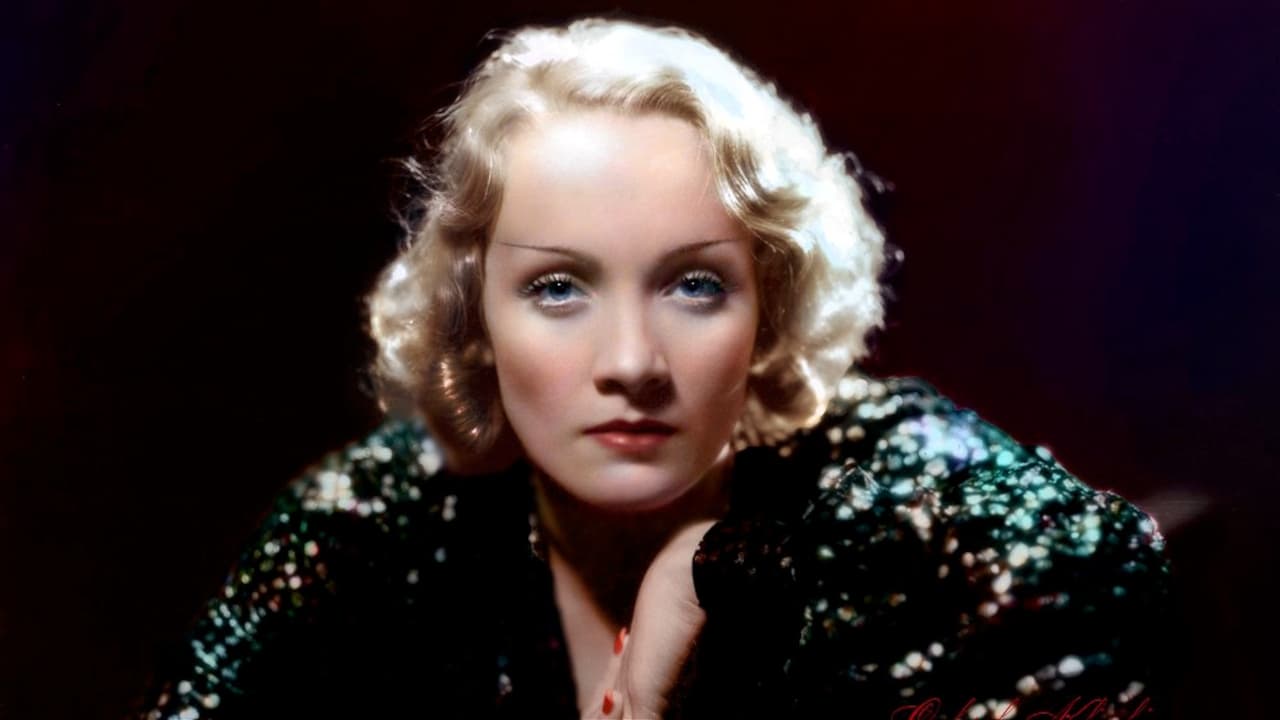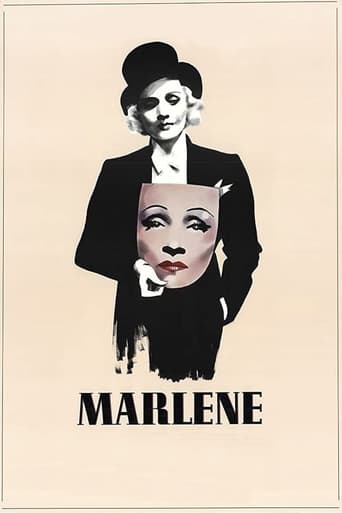Boobirt
Stylish but barely mediocre overall
Kidskycom
It's funny watching the elements come together in this complicated scam. On one hand, the set-up isn't quite as complex as it seems, but there's an easy sense of fun in every exchange.
Voxitype
Good films always raise compelling questions, whether the format is fiction or documentary fact.
Sarita Rafferty
There are moments that feel comical, some horrific, and some downright inspiring but the tonal shifts hardly matter as the end results come to a film that's perfect for this time.
blanche-2
I've seen another documentary on Marlene Dietrich and also read her daughter's book. I was interested in this one for a bizarre reason- I once sat on the New York subway next to someone who had the script of this documentary with him. Being a big fan of Maximilian Schell's, I wanted to see it.Schell, who appeared with Dietrich in "Judgment at Nuremberg," was able to convince the actress to do this documentary, but she would not permit herself to be shown on camera. She was last seen in the 1978 film Just a Gigolo, heavily made up and behind a veil, but still looking mighty good to me. But if one reads her daughter's book, it's easy to see that as she aged, she became a little eccentric. She spent the last 11 years of her life bedridden and allowed very few people to see her.So the famous Dietrich voice supplies a narration of sorts to the glorious film clips, clips of her in newsreels, and film of her doing her one-woman show. It is all glorious, showing how she evolved over the years, her excellent acting in films like "Judgment at Nuremberg," "Witness for the Prosecution," and "Touch of Evil," and the incredible charisma and beauty she shared with the audience in her show. At one point, Schell offends her and she lays into him. making a remark about him being a "Swiss", and telling him she'd sat at tables with politicians and dignitaries and no one had ever spoken to her like that. She went on for a while. Schell punctuates her words with images of flying film strips and a whizzing, distorted background.She could be abrupt, but also emotional as she recites a favorite poem of her mother's. Dietrich talks like she hated making movies, didn't do much to get into a role, her private life was private. It's hard to say now. One thing that wasn't gone into was her passion for Jean Gabin, nor was much of the documentary focused on her war work. Marlene Dietrich was a magical personality, an exotic beauty, a wonderful actress, and a magnificent performer. This documentary gives us plenty of examples of her magic and, if you don't appreciate her now, you will after seeing this. She was the kind of star we won't see again - androgynous, earthy, and very much of her time. In her eighties when this was made, her attitude is very much like her final words in Touch of Evil: "What does it matter what you say about people?"
MartinHafer
Marlene Dietrich was notorious for her unwillingness to be seen once she retired. Yet, somehow, this very secretive actress and singer was convinced by Maximillian Schell to make a documentary. But, because she was so secretive, she imposed conditions on the film that made making it very, very difficult--practically impossible. They were not allowed to show her at any time nor any of the pictures on the walls. And, while agreeing to being interviewed, it could only be done with a tape recorder--forcing the use of lots of irrelevant footage, old photos and film clips.Now all this sounds very confusing and difficult for Schell...but it gets worse. As he asks her questions about her old films or her life, she keeps responding by saying cranky things like 'I already spoke about that in my book and don't want to talk about it', 'that film is kitsch and I hate it' and other dismissive comments. Despite this, Schell tried to engage her throughout the film--mostly to be rebuffed. In fact, you learn almost nothing about Marlene other than the fact that she doesn't want you to learn much of anything! It's really a waste of time and fans of this enigmatic actress should just do as she says....READ A BOOK! Very disappointing and I have no idea why this film was nominated for an Oscar, as there is not category for Most Frustrating Picture! My feeling is that folks who love Marlene Dietrich are best served with their memories and should probably just avoid this strange film.
U.N. Owen
MARLENE (1984) is a documentary of one of the 20th cetury's most alluring women.As I write this (late Oct, '11), we've just had the passing of APPLE CEO, Steve Jobs, and, these 2 different people have a lot in common:They both were very controlling of their image.Marlene was discovered, molded by director Josef von Sternberg. As the world, and media were quite different, Marlene was molded in different ways. Everything - from (supposedly) having her back molars removed, to the way she was lit - EVERYTHING was tightly controlled.I say this, because when MARLENE's director (and one-time Dietrich co-star) Maximillian Schell approached Dietrich, she said yes (Ms. Dietrich had for the past 20 years, had become a virtual recluse - her only prior screen appearance - JUST A GIGOLO, had featured Ms. Dietrich behind both gauze, and diffusion filters on the lens - he felt he would 'direct.'However, one of Ms. Dietrich's stipulations, was that she not be filmed - only allowing her voice to be recorded.I can understand both Mr. Schell's disappointment with this arrangement, but, I also understand Ms. Dietrich's urge to control her image. She wanted to till be perceived by her fans as she once was.It's apparent to the viewer that Ms. Dietrich felt that at this point (1984) her life was, in essence - over.Whether you agree or not, bear in mind that this is the view of a woman, who, from her teen years onward, hab been so controlled, that, as the years had passed, she was at a point in her life where (she felt) she could no longer 'create' the illusion of 'Marlene Dietrich.'Let me give a quick background;When film work became scarce, Marlene moved to the stage, where she did her incredible stage shows, but, even then - everything the public saw, was heavily controlled: lighting, the clothing (heavy under-boning, built in, to give Ms. Dietrich a 'va-va-voom' look.I can't recall who said it, but, someone had seen one of her stage performances, where she appeared (well in to her 60's!) as the eternally gorgeous Marlene Dietrich.He went backstage, and said he saw an 'old woman - ironing.' That was Ms. Dietrich, sans the lighting, the makeup, the beautifully constructed gowns.So, it is with bearing this in mind, that, by '84, Ms. Dietrich had long ago retired, from 'life,' - the artificially created, maintained 'Marlene Dietrich,' only allowing those most intimate to see her. Having said this, I can understand both Mr. Schell's disappointment with this arrangement, but, I also understand Ms. Dietrich's urge to control her image. She wanted to till be perceived by her fans as she once was.What the end result is, is a dialogue between Ms. Dietrich and, Mr.Schell - as the two watch Marlene's films, and comment on them.'Shhmutz,' (a German word meaning dirt) as well as 'kitsch' (tasteless), are two words that Ms. Dietrich uses to describe many of her best-loved, classic films. I think a large part of this film is what's NOT seen - NOT heard.The voice - still strong - is that of a woman, who sees herself, her life, as being one big performance, and, sadly, doesn't see the love, and adulation, but can only view her 'professional' self, and all it's imperfections, with a cold, clinical eye.Mr. Schell, who is obviously a fan, as well as an actor/director - tries though MARLENE to subtly get Ms. Dietrich to open up, and see the love, but, sadly, that never happens.As a fan of hers, I could laugh at her jokes, but, I still felt melancholic. You wish: 'if only she knew.'If only.
Michael Neumann
Maximilian Schell's documentary portrait of legendary screen siren Marlene Dietrich separates the woman from her myth, but because Dietrich herself refused to appear on camera the director was presented with a dilemma: how to construct the film without its subject? His clever (if desperate) solution was to document, instead, his own frustration in making the film, using Dietrich's disembodied, tape recorded voice to supplement scenes of the director scrambling for cohesive footage.Surprisingly, the finished film (messy as it often is) creates a remarkably full picture of the reclusive star, despite (and in large part because of) her absence. Dietrich's voice alone – obstinate, caustic, skeptical of Schell's project, scornful of her own allure – says more (with more insight) than any scripted monologue could provide, and her unedited conversations with Schell (an old comrade) are unpredictable and candid, often becoming verbal sparring matches in two languages.

